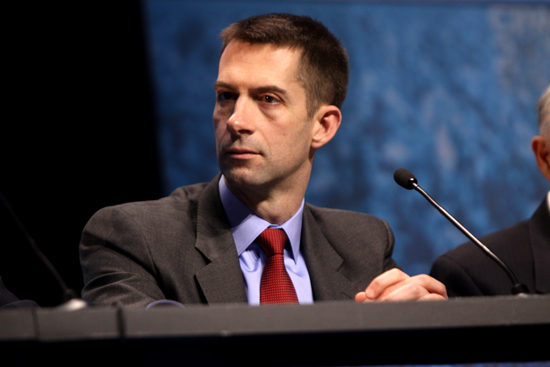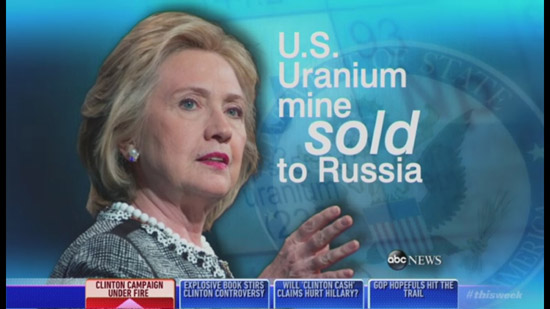A question for Peter Schweizer: If you’re against money in politics, what should we do to stop it?
George Stephanopoulos interviewed Peter Schweizer yesterday in advance of his book “Clinton Cash”.
He asked some decent questions focused on whether Schweizer has any evidence of criminal behavior to which Schweizer basically said “no”.
Of course Schweizer has no evidence of criminal behavior. If he did, Clinton would be under arrest. This is a political attack.
The interesting thing about the attack is that Stephanopoulos mimics what we’re supposed to do. He gets outraged about a lack of evidence. Or as outraged as George Stephanopoulos can get anyways. Meanwhile the attack gets repeated ad nauseum in the media.
Stephanopoulos feigns the role of protagonist, allows Schweizer to repeat all his claims, and ABC shows some scary graphics.
I’ve already seen several people repeating the attacks and the book hasn’t even been released.
What conservatives don’t realize is that Schweizer is doing us a favor. Here’s how to use his (or anyone else who tries similar) attacks to fight against money in politics.
At the heart of Schweizer’s case is a moral argument against money in politics. All you have to do with anyone who brings up this type of argument is thank them for bringing it up and ask, how should we solve it?
Don’t get bogged down trying to dispute claims for which there’s no evidence.
Just ask how we should solve it. You can even offer a few suggestions:
- Represent.us – A coalition of folks from both the left and right fighting against money in politics.
- Move to Amend – A group dedicated to amending the Constitution to get money out of politics.
- The Sunlight Foundation – A non-partisan group dedicated to transparency in government.
Or talk about fixing Citizens United. Other suggestions are here.
If you need another handy example, point to Tom Cotton and his recent attempt to drag us into a war Israel wants us to fight for them. Bring up how the guy who wrote the Congressional letter to Iran trying to undermine peace negotiations received nearly $1 million for his campaign just five months ago from the Emergency Committee for Israel. He also received $165,000 from Paul Singer’s hedge fund, another billionaire that wants war with Iran.

Congressman Tom Cotton at CPAC 2013 by Gage Skidmore CC BY-SA 2.0.
The strategy Schweizer is trying to use is to appear populist by attacking Clinton for receiving donations of large amounts of money. The trouble is that Schweizer isn’t a populist. He’s always worked for Republicans. He is faking populism and pushing a Republican position.
The way to demonstrate this is to simply ask him, how should we solve the problem? What efforts do you support?
When people you know post about or bring up these attacks, don’t waste your time disputing details. Facts never stopped a good story.
Ask them how they want to stop it. If they’re sincerely populist, suggest they make a donation or help out one of the above groups. When you ask, be sure to ask sincerely because you never know where you might find an ally. What should we do to help?
What’s more than likely, however, is that they won’t want to talk about money in politics. Why? Because they’re fine with money in politics when it goes to Republicans. Money is just not supposed to go to Democrats.
This is why they’ve spent the last 40 years fighting to open up politics to money.
If they don’t want to pursue this path, here’s the next question:
What are you angry about? If money in politics isn’t a problem, don’t you have the system you want? What is Hillary doing wrong?
I’ve had people flat out tell me that money doesn’t influence elections. Well, if money doesn’t influence elections, what are you mad about? What is Mr. Schweizer mad about?
You’re either outraged about money in politics or you’re playing politics.
This is why his book is actually a godsend because it raises the issue of money in politics.
All you have to do to either gain an ally or make someone look silly is ask them to fight against money in politics with you. One or the other has to happen.
Why?
If your moral position is “I’m against money in politics” and you refuse to fight against it, then you are not against money in politics. You are a Republican playing politics. And you look like a Republican playing politics.
Republican-only money is not a strong moral position. That’s why Mr. Schweizer is trying to claim a populist mantle.
Don’t let him (or anyone else for that matter). If you want to be against money in politics, be against it. Come fight with me. If not, well it’s hard to take your position seriously.
The question George Stephanopoulos should have asked is, what would you do about money in politics? How do we fix it?
When the issue comes up (and it will), ask the people you know. It’s a great opportunity to talk about the influence of money in politics. Just remember that your goal should be: come do something about it with me.
—
 |
David Akadjian is the author of The Little Book of Revolution: A Distributive Strategy for Democracy. Follow @akadjian |











